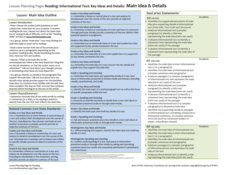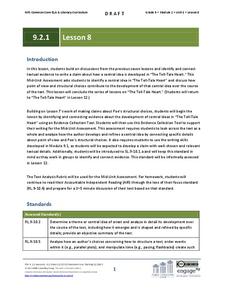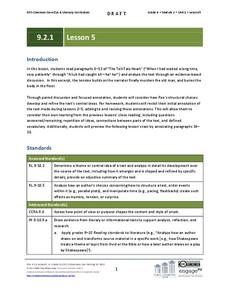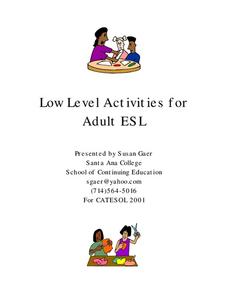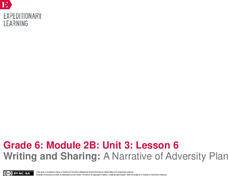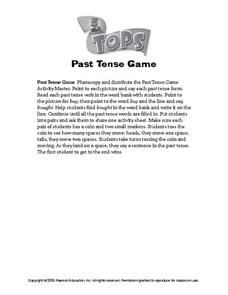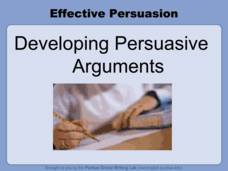Worksheet Web
What did it Say? – Summarizing
Provide scholars with an opportunity to practice summarizing text with a two-page learning exercise. Learners read poems, share stories with their peers, and summarize their new-found-knowledge.
Perkins School for the Blind
Where Shall I Put It?
Position and positional phrases are concepts that need to be constructed for learners with low or no vision. Help them gain competence and a conceptual understanding of words like on, in, and under with a funny game. After gathering a...
For the Teachers
Main Idea Outline
Find the main idea in an informational text with a versatile lesson. Three levels of differentiation help you implement the strategy in any age or class level, based on the ability and objectives of your learners.
EngageNY
Grade 11 ELA Module 1: Unit 2, Lesson 8
How does Shakespeare employ figurative language to emphasize central ideas in Hamlet? Using an interesting resource, learners complete a Quick Write to answer the question. Additionally, they continue their study of the play by exploring...
EngageNY
Researching: Eyewitness Accounts, Part 2
Continue on. Learners continue with the work they began in the last lesson looking for quotes to complete an eye witness interview. Pupils work in their groups to examine the texts in their research folders and The Great Earthquake and...
EngageNY
Grade 10 ELA Module 4: Unit 2, Lesson 11
How does Shakespeare develop the idea of appearance versus reality in Macbeth? Using the resource, pupils discuss the plot in small groups. Scholars also complete a Quick Write analyzing how the interactions between Macbeth and Lady...
EngageNY
Writing an Argument Essay: Evaluating the Model and Crafting a Claim (Chapter 28, Including Synthesis of Scenes in Previous Chapters)
Scholars use the model essay from the previous instructional activity to create their own argumentative essays. Readers make a claim about Atticus defending Tom in To Kill A Mockingbird. They then use graphic organizers to develop and...
EngageNY
Grade 9 ELA Module 2: Unit 1, Lesson 8
Rid yourself of unsupported analytic writing forever with a mid-unit assessment focused on Edgar Allan Poe's "The Tell-Tale Heart." As ninth graders formulate an essay based on evidence from the first seven lessons in the unit, they...
Road to Grammar
Globalization
How familiar are your pupils with globalization? Hold a discussion on that topic using the questions and viewpoints provided here. Learners can study the vocabulary and read the points of view in order to prepare for the final talk.
EngageNY
Grade 9 ELA Module 2: Unit 1, Lesson 5
Eager readers have waited a long time, very patiently, for a set of literary analysis lessons that connect text structure to the work's central idea. As ninth graders continue reading "The Tell-Tale Heart," they focus on the central...
EngageNY
Grade 10 ELA Module 4: Unit 2, Lesson 13
Lady Macduff uses a metaphor to suggest that her husband does not possess the courage of even a tiny, short-winged bird—ouch! Using the resource, pupils discover Act 4.2 of Shakespeare's Macbeth. Using reading, writing, and discussion,...
Curated OER
Cold Sassy Tree: Vocabulary Development
Change places with your pupils, and let them teach their peers! Each learner signs up to teach a word from a list provided by the teacher (included here). Then, they complete a graphic organizer to help them develop a better...
Curated OER
The Learning Network: Alligators Everywhere Fill-In
Meant to be used with the article, "In Florida, the Natives Are Restless" (included here), this is a great source of high-interest, nonfiction reading. A fill in the blank vocabulary activity and an activity focusing on reading...
Curated OER
Low Level Activities for Adult ESL
Suggestions for interview topics with question prompts, scavenger hunts, oral presentations, and reading and writing prompts abound in this 11-page packet of activities for English language learners. ESL worksheets are also included...
Project Shine
ESL Health Unit: Describing Pain and Symptoms
Designed for advanced beginning English language learners, this 21-page packet includes listening, speaking, and writing practice exercises related to the theme of visits to the doctor's office.
EngageNY
Grade 10 ELA Module 4: Unit 2, Lesson 19
A tragic play includes imperfect heroes, pity and fear, and a fatal flaw. Scholars analyze Shakespeare's Macbeth as an example of the tragedy genre. Pupils demonstrate understanding by completing a Quick Write discussing how Shakespeare...
EngageNY
Grade 10 ELA Module 4: Unit 3, Lesson 3
What's the difference between men and princes? Machiavelli discusses this distinction in chapter 18 of The Prince. Scholars first listen to a masterful reading of the chapter. Then, they write about how the author develops a central idea...
EngageNY
Grade 10 ELA Module 4: Unit 3, Lesson 1
Is it better to be loved or feared? Using the resource, scholars explore Machiavelli's nonfiction text, The Prince, and examine the author's ideas about the role of leadership. Pupils also complete a Quick Write to analyze a central idea...
EngageNY
Inferring about Character: Analyzing and Discussing Points of View (Chapter 2)
Welcome to the World Café! Readers discuss A Long Walk to Water by Linda Sue Park. They circulate throughout the classroom, stopping at different tables to answer a discussion prompt with their classmates and record their ideas on a chart.
EngageNY
Building Background Knowledge: The Dinka and Nuer Tribes Until the Mid-1980s (“Sudanese Tribes Confront Modern War” Excerpt 1) (Version 1)
Readers consider comparisons between the Dinka and Nuer tribes in South Sudan, making connections between an informational article about Sudanese tribes and the novel A Long Walk to Water by Linda Sue Park. They annotate the text to help...
EngageNY
Writing and Sharing: A Narrative of Adversity Plan
When life brings you lemons .. write about it! Scholars work with partners to complete graphic organizers analyzing two narratives. Next, they develop an outline for their narrative writing assignment about a personal experience with...
Curated OER
Jargon and Development Speak
Jargon is usually composed of long, area-specific vocabulary that is not necessarily easy to understand. A category known as "DevelopmentSpeak" is used in development organizations and is often quite verbose. Help your learners avoid...
Pearson
Past Tense Game
Teach and taught, learn and learned! Work with your class on the past tense with some guided practice and a game. As a class, match the present tense verbs with their past tense counterparts. Learners then split off into pairs to play...
Curated OER
Effective Persuasion: Developing Persuasive Arguments
Use research to strengthen a persuasive argument. Examples of ethos, logs, and pathos are presented, and learners discuss how using research can improve one's argument. Pair this presentation with an example persuasive piece to point out...


